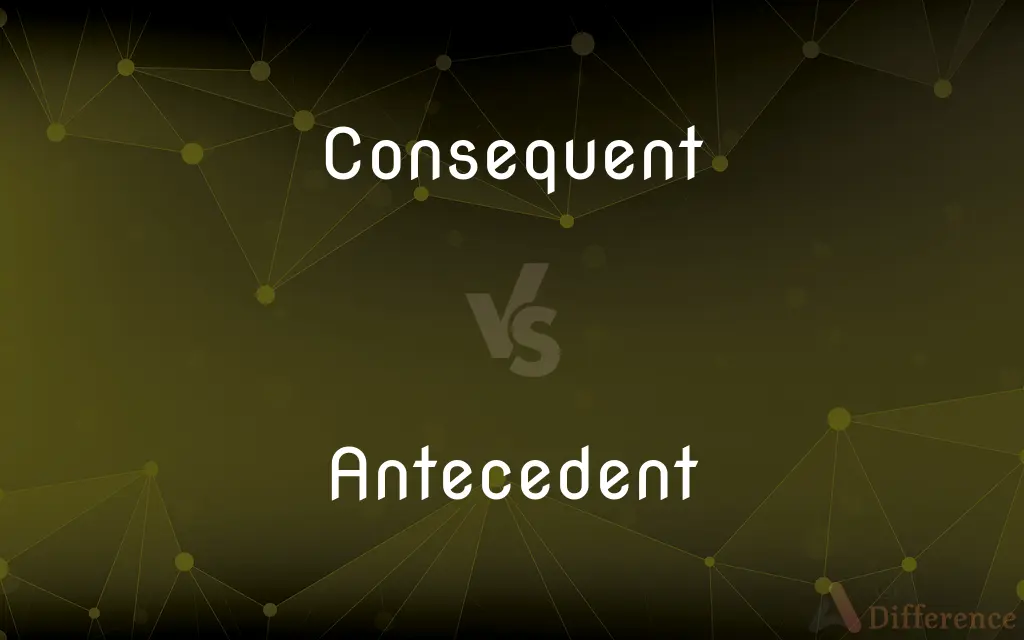Consequent vs. Antecedent — What's the Difference?
By Tayyaba Rehman — Updated on October 12, 2023
Antecedent is what precedes; Consequent is what follows. Consequent is dependent on the Antecedent for its truth or realization.

Difference Between Consequent and Antecedent
Table of Contents
ADVERTISEMENT
Key Differences
Antecedent and Consequent are vital components in logical and grammatical structures. The Antecedent sets the stage or context, often laying out the conditions or events that come first. In contrast, the Consequent is the result or outcome that arises due to the antecedent.
Antecedent and Consequent also have significant roles in conditional statements, particularly in logic. Here, the Antecedent often represents the "if" part of a statement, while the Consequent denotes the "then" segment. Thus, the Consequent is dependent on the Antecedent for its truth or realization.
In grammar, Antecedent and Consequent can sometimes be linked to pronouns and their references. An Antecedent is the noun or noun phrase to which a pronoun refers. On the other hand, Consequent isn't typically used in this specific context in grammar, but understanding its logical function can help clarify the relationship between cause (Antecedent) and effect (Consequent).
Understanding the relationship between Antecedent and Consequent is crucial for clear communication and reasoning. While the Antecedent provides the necessary context or condition, the Consequent sheds light on the outcome or result of that condition. Together, they form a cause-and-effect relationship that aids in effective argumentation and clarity of thought.
Antecedent and Consequent, when understood and used appropriately, can greatly enhance the precision and clarity of an argument or statement. Recognizing the foundational role of the Antecedent and the derivative nature of the Consequent helps in creating strong logical connections in various domains of discourse.
ADVERTISEMENT
Comparison Chart
Position in Statement
Follows the condition, often after "then".
Precedes the result, usually introduced by "if".
Role in Logic
Outcome or result in a conditional statement.
Condition or premise in a conditional statement.
Relationship
Dependent on the antecedent.
Independent; sets the stage for the consequent.
Usage in Grammar
Less common; typically not used in pronoun reference.
The noun a pronoun refers back to.
Cause or Effect?
Effect or result of a given condition or premise.
Cause or condition leading to a consequent.
Compare with Definitions
Consequent
Following as a result or effect.
The consequent damages were extensive.
Antecedent
A preceding event, condition, or cause.
The antecedent events led to the revolution.
Consequent
In a cause-and-effect relationship, the effect or outcome.
The thunder is the consequent of lightning.
Antecedent
The word, phrase, or clause to which a pronoun refers.
In the sentence John said he was tired, John is the antecedent of he.
Consequent
A result or effect.
The storm was the consequent of the atmospheric changes.
Antecedent
Prior, or existing before.
The antecedent knowledge of the subject helped her excel.
Consequent
An outcome in a logical or mathematical statement.
In the statement If it rains, then the ground gets wet, the wet ground is the consequent.
Antecedent
The conditional part of a hypothetical proposition.
In If it rains, then the match will be canceled, If it rains is the antecedent.
Consequent
Something that follows logically or naturally from a particular action or situation.
The consequent of his decision was a series of unfortunate events.
Antecedent
A thing that existed before or logically precedes another
Some antecedents to the African novel might exist in Africa's oral traditions
Consequent
A consequent is the second half of a hypothetical proposition. In the standard form of such a proposition, it is the part that follows "then".
Antecedent
A person's ancestors or family and social background
Her early life and antecedents have been traced
Consequent
Following as a result or effect
You've got a university place consequent on your exam results
The social problems of pupils and their consequent educational difficulties
Antecedent
An earlier word, phrase, or clause to which another word (especially a following relative pronoun) refers back.
Consequent
(of a stream or valley) having a direction or character determined by the original slope of the land before erosion.
Antecedent
The statement contained in the ‘if’ clause of a conditional proposition.
Consequent
The second part of a conditional proposition, whose truth is stated to be implied by that of the antecedent.
Antecedent
Preceding in time or order; previous or pre-existing
Antecedent events
Consequent
The second or imitating voice or part in a canon.
Antecedent
Denoting or counting as an antecedent.
Consequent
Following as a natural effect, result, or conclusion
Tried to prevent an oil spill and the consequent damage to wildlife.
Antecedent
Going before; preceding.
Consequent
Following as a logical conclusion.
Antecedent
One that precedes another.
Consequent
Logically correct or consistent.
Antecedent
A preceding occurrence, cause, or event.
Consequent
(Geology) Having a position or direction determined by the original form or slope of the earth's surface
A consequent river.
A consequent valley.
Antecedent
Antecedents The important events and occurrences in one's early life.
Consequent
(Logic) The conclusion, as of a syllogism or a conditional sentence.
Antecedent
Antecedents One's ancestors.
Consequent
The second term of a ratio.
Antecedent
(Grammar) The word, phrase, or clause that determines what a pronoun refers to, as the children in The teacher asked the children where they were going.
Consequent
Following as a result, inference, or natural effect.
His retirement and consequent spare time enabled him to travel more.
Antecedent
(Mathematics) The first term of a ratio.
Consequent
Of or pertaining to consequences.
Antecedent
(Logic) The conditional member of a hypothetical proposition.
Consequent
(geology) Of a stream, having a course determined by the slope it formed on.
Antecedent
Earlier, either in time or in order.
An event antecedent to the Biblical Flood
An antecedent cause
Consequent
(logic) The second half of a hypothetical proposition; Q, if the form of the proposition is "If P, then Q."
Antecedent
Presumptive.
An antecedent improbability
Consequent
An event which follows another.
Antecedent
Any thing that precedes another thing, especially the cause of the second thing.
Consequent
(math) The second term of a ratio, i.e. the term b in the ratio a:b, the other being the antecedent.
Antecedent
An ancestor.
Consequent
(geology) A consequent stream.
Antecedent
(grammar) A word, phrase or clause referred to by a pronoun.
Consequent
Following as a result, inference, or natural effect.
The right was consequent to, and built on, an act perfectly personal.
Antecedent
(logic) The conditional part of a hypothetical proposition, i.e. , where is the antecedent, and is the consequent.
Consequent
Following by necessary inference or rational deduction; as, a proposition consequent to other propositions.
Antecedent
(logic) The first of two subsets of a sequent, consisting of all the sequent's formulae which are valuated as true.
Consequent
That which follows, or results from, a cause; a result or natural effect.
They were ill-governed, which is always a consequent of ill payment.
Antecedent
(math) The first term of a ratio, i.e. the term a in the ratio a:b, the other being the consequent.
Consequent
That which follows from propositions by rational deduction; that which is deduced from reasoning or argumentation; a conclusion, or inference.
Antecedent
Previous principles, conduct, history, etc.
Consequent
The second term of a ratio, as the term b in the ratio a:b, the first a, being the antecedent.
Antecedent
Going before in time; prior; anterior; preceding; as, an event antecedent to the Deluge; an antecedent cause.
Consequent
Following as an effect or result;
The period of tension and consequent need for military preparedness
The ensuant response to his appeal
The resultant savings were considerable
The health of the plants and the resulting flowers
Antecedent
Presumptive; as, an antecedent improbability.
Antecedent
That which goes before in time; that which precedes.
The Homeric mythology, as well as the Homeric language, has surely its antecedents.
Antecedent
One who precedes or goes in front.
My antecedent, or my gentleman usher.
Antecedent
The earlier events of one's life; previous principles, conduct, course, history.
If the troops . . . prove worthy of their antecedents, the victory is surely ours.
Antecedent
The noun to which a relative refers; as, in the sentence "Solomon was the prince who built the temple," prince is the antecedent of who.
Antecedent
The first or conditional part of a hypothetical proposition; as, If the earth is fixed, the sun must move.
Antecedent
The first of the two terms of a ratio; the first or third of the four terms of a proportion. In the ratio a:b, a is the antecedent, and b the consequent.
Antecedent
Someone from whom you are descended (but usually more remote than a grandparent)
Antecedent
A preceding occurrence or cause or event
Antecedent
Anything that precedes something similar in time;
Phrenology was an antecedent of modern neuroscience
Antecedent
The referent of an anaphor; a phrase or clause that is referred to by an anaphoric pronoun
Antecedent
Preceding in time or order
Antecedent
Preceding in time or order.
Ancient Rome is an antecedent civilization to modern Italy.
Common Curiosities
How is Antecedent used in grammar?
Antecedent is the noun or noun phrase to which a pronoun refers back to in a sentence.
Can a sentence have multiple Antecedents?
Yes, a sentence can have multiple nouns that pronouns refer back to, making them antecedents.
Are Antecedent and Consequent opposites?
Not opposites, but they represent a sequence; Antecedent sets a condition while Consequent is the resulting outcome.
Is the term Consequent used in mathematics?
Yes, Consequent is used in mathematics, especially in ratios where it's the second term of the ratio.
Can a single statement have multiple Consequents?
While a single Antecedent can lead to multiple outcomes, each conditional statement typically has one clear Consequent.
What is a Consequent in logic?
Consequent is the outcome or result part in a conditional statement, usually following "then."
Can Consequent exist without Antecedent?
Typically, in conditional statements, the Consequent is dependent on the Antecedent for its realization.
How does the Antecedent affect the Consequent?
The Consequent is derived or dependent on the condition set by the Antecedent; if the Antecedent is true, then the Consequent follows.
Are there contexts where only the Antecedent or only the Consequent is present?
While they typically appear together in conditional statements, it's possible for statements to have an implied Antecedent or Consequent.
Why is understanding the relationship between Consequent and Antecedent important?
It aids in effective argumentation and ensures clarity in communication by establishing a cause-and-effect relationship.
How are Antecedent and Consequent related in terms of cause and effect?
The Antecedent represents the cause or condition, while the Consequent signifies the effect or outcome.
And in the same statement, which is the Antecedent?
"If you study" is the Antecedent.
In the statement "If you study, then you'll pass," which is the Consequent?
"You'll pass" is the Consequent.
Is Consequent commonly used in everyday English?
While "consequent" is more prevalent in formal, logical, or academic contexts, it's less common in everyday conversation.
Do Antecedent and Consequent always represent true relationships?
Not necessarily. A statement's truth depends on its content, not just its structure. An Antecedent can be true, but the Consequent may not follow in reality.
Share Your Discovery

Previous Comparison
Requestee vs. Requestor
Next Comparison
Extravagant vs. ProdigalAuthor Spotlight
Written by
Tayyaba RehmanTayyaba Rehman is a distinguished writer, currently serving as a primary contributor to askdifference.com. As a researcher in semantics and etymology, Tayyaba's passion for the complexity of languages and their distinctions has found a perfect home on the platform. Tayyaba delves into the intricacies of language, distinguishing between commonly confused words and phrases, thereby providing clarity for readers worldwide.















































